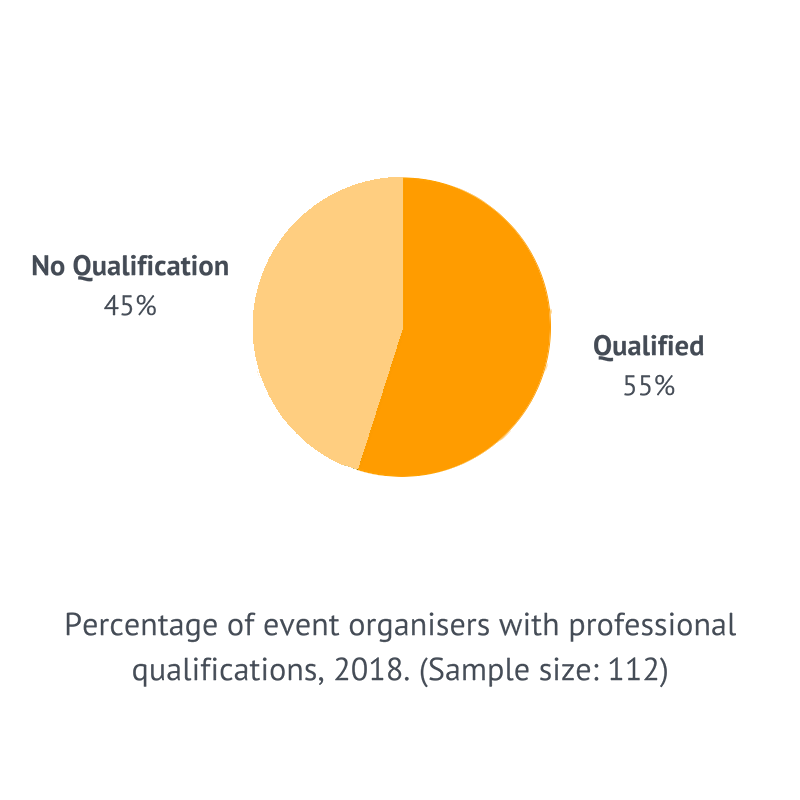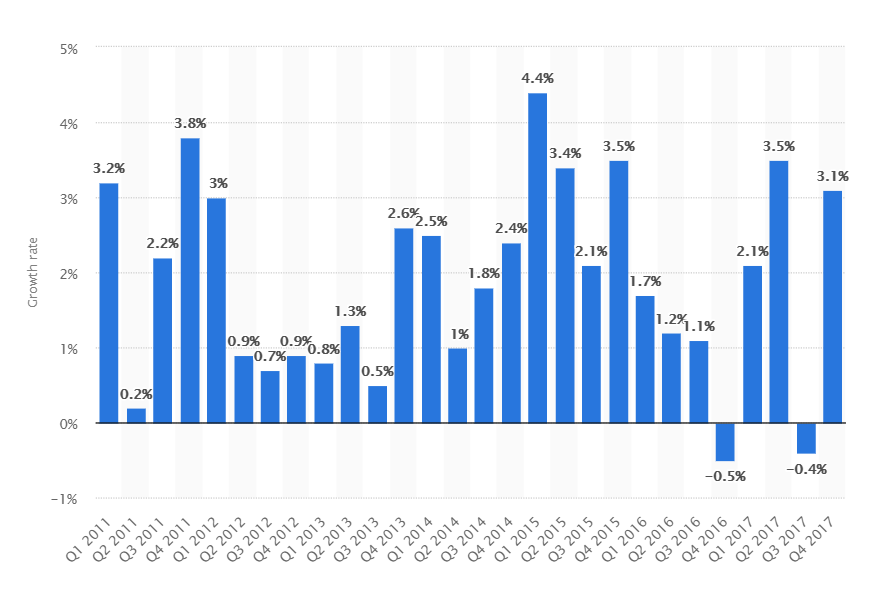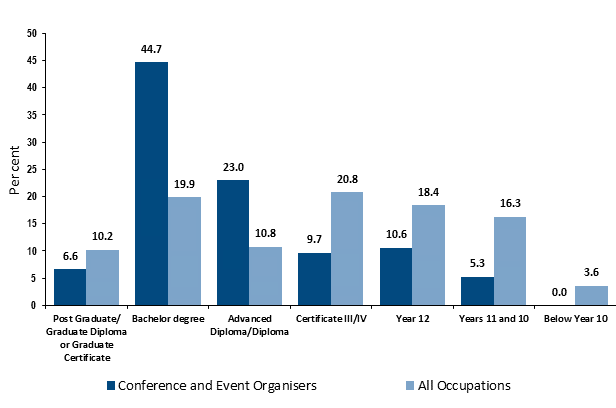
3 Specific Reasons Why You Should Get an Event Planning Qualification
Candidates with a bachelor’s degree in meeting and event management, hospitality, or tourism management should have the best job opportunities.
– The US Bureau of Labor Statistics
This, to me, is extremely frustrating.
Not because I don’t hold a degree in any of these, but because, for a bureau of statistics, you’d think they’d focus on this thing called “at least some factual analysis.”
To be fair to bureaucratic entities, they do state on their website that, “Most… event planning positions require a bachelor’s degree” which is at least an attempt at justifying the hypothesis.
When it comes to the initial evidence I had going into writing this post, I had no stats to begin with either, but then again, I’m not a State department.
Given that it’s my literal job to work alongside event organisers both online and off, I’ve heard time and again that there’s a gap in the market for proof around whether or not event management qualifications and degrees are worth the time and money that goes into them.
So, I dug a little deeper.
After some investigation, I got the same answer as I do to most questions that are quite contentious: “maybe.”
Maybe you should get an event degree, because it might not always be a feasible path for you to pursue. That might be because of personal circumstance like the amount of money or funding available to you, or other personal or professional commitments. And that’s fine.
But if you can at all, the evidence holds that you should probably get an event degree. Let’s look at just three reasons for the moment, and disagree about them later:
1) It Gives You an Edge Over Your Industry Peers
We surveyed 112 global event managers to get a grasp on what the current break down of qualifications is like. Out of that 112, 56 said they had a qualification or degree in event management with 46 saying that they didn’t have any relevant, professional qualification:

Source: Team Tito, 2018.
As with any survey, it’s hard for respondents to say all they need to in a click of a button, meaning there were quite a few insights into event planning qualifications beyond the percentages. As the numbers suggest, the feedback was mixed.
There were those who insisted on the value of event education:
“I have a degree in education, but I have no educational training in event management. However, I have been lucky enough to be very successful in my business. I think any education that you get is worth the time and money.”
And those who were less enthusiastic:
I started doing event planning 25 years ago when it wasn’t “a thing” and you couldn’t get higher education on this. At this point, I would be reluctant to take training unless I knew for sure it would cover new topics – i.e event tech developments.
Irrespective of what you take is on the value of education generally, having an event qualification will enable you with a type of readiness that just under half of your competitors are without.
That said, among the commentators, there was a specific cautionary tale that stuck out:
An event management degree is absolutely worth it. Be wary of ‘certifications’ unless they are endorsed by the major industry associations, though.
In terms of how spooked you can be by a two sentence paragraph, this one falls into the bracket of “very spooked.”
Thankfully, there are some resources out there to help you weed out what’s bogus and what’s legitimate when it comes to event planning qualifications. For example, if you’re based in the UK, you can see what institutions provide recognised accreditation in event management by using Hedd.
2) You Learn In and Outside of the Lecture Hall
Off the back of that elephant in the classroom, I wanted to dig into what those legitimate courses are doing to enable their event management students.
What Does an Event Management Degree Look Like?
While you can read 1000+ course outlines from global institutions on event management, they begin to blend together in a swarm bullet points and “I would highly recommend this course to anyone”s.
To make it all a bit more digestible, I went to the source. I spoke with Feargus Dunne, a lecturer in Tourism and Event Management in IT Tralee to get an in-depth analysis of what you can expect from a structured course in event management.
What Will Help Students Most?
You don’t need to be an expert at everything, but you’ve got to be able to talk the language.
This course in event management was launched in December 2017 to acknowledge a need that Feargus and his department saw; namely, that “there were very few courses in Ireland focusing exclusively on event management.” The subject of event planning was relegated to one or two modules here and there, attached to other disciplines.
“This is a three-year honours degree. Usually you can get an ordinary degree in three years or an honours degree in four, so there’s a lot in it. And, if you’re willing to work hard, you can be finished really quickly. Someone working in events can do this course from September to May and can fit it in with the event management lifecycle.”
However, figuring out what course content to include became a challenge, mostly because organising events is such a broad discipline, so Feargus et al decided to consult some experts:
“We consulted with a lot of graduates from other degrees. The event industry has been growing quickly over the last 15 to 20 years, but the academic world has been slow to catch up with that. We wanted it to be very practical, and to include industry processes. “e consulted widely with industry partners, including Cuckoo Events (Dublin) and the INEC (Killarney)“

Growth of the event industry in the US by quarter. Source: statista.com
Practical versus Theoretical
Hopefully this course will professionalise the industry.
A lot of event planners will tell you (insistently) that you need to learn how to organise an event by doing, not by studying. This begs the question, do you need to study an industry that’s so practically focused, and based around real world scenarios?
Feargus’ answer was, essentially, that both means of learning are equally valuable:
“We work on continuous assessment throughout the year to build soft skills like leadership, team building, research, and writing skills. If you’re poor in a certain area like website development and social media tools, we can help you there.”
As the conversation went on, it seemed that an event planning qualification like this encompasses a taste of every aspect an event organiser needs to get their foot in the door.
However, I wondered if, even when students gained all that theoretical understanding, they’d find difficulty when they had to face the real world of events head-on, without the helping hand of textbook references or case studies. To my relief, this was already being catered for in IT Tralee:
“Our students work in the industry on two placements, so they get a change to get out there and stuck in. In the first year, you work 80 hours (at events) over the course of the semester. We have a contact list of venues, festivals and events to help students get placement.”
But, most importantly, the faculty aren’t running the risk of spoon-feeding their students either:
“We’re giving (our students) the skills to get work placement themselves. In third year, you’ll run your own event and do your own financial management. It’s a summer placement and the hope is that the employer would then be in a position to keep people on for future work.”
Key Areas
Depending on where you are, what you can afford, and what skills you need, there are a multitude of different event planning qualifications, as I’ve mentioned above. When evaluating if it’s right for you to get a degree, you’ll want to know what you’ll learn before you commit to it.
The course in IT Tralee focuses on a variety of topics, including design, a masterclass series with 6 industry experts where you can discuss real-life event problems, and business applications.
Perhaps one of the most valuable aspects of taught courses on event organisation is the experience and knowledge of your teachers;
We’re giving them the connections and working with them on their relationships.
“We assess students continuously through reflective journals, and the hours they work. From there, they get feedback reports from their supervisors and mentors.”
3) Other Event Organisers Are Just As Smart As You
Outlook for Jobs in Event Management
The typical pay for an event planner is around $43,000/year. And the number of jobs in the field is expected to rise by 11% from figures in 2016 through 2026. But, do you really need a specific degree to get into the profession?
Some of the most skilled and inventive event organisers I’ve worked with haven’t had dedicated event management degrees, but with an increasingly qualified workforce, an accreditation certainly can’t hurt.
While we’ve been talking specifically about event planning qualifications here, those who are in event organising gigs are well-educated on the whole:

Source: joboutlook.gov.au
To refer back to the original survey we worked on at Tito, there was a theme of moving peripherally into the event industry among those who said they didn’t have a specific event qualification:
I have an AS in Social and Behavioral Science, and BS in Psychology. I stepped out on faith and passion when I started my events business, but I want to go back to obtain my masters in an area that’s beneficial to the company.
So, while your industry peers might not have “BA in badass events” stitched to the end of their names, the industry is one full of innovative event producers who have been educated in other relevant fields, meaning an event qualification is something that might boost your profile.
So, Still “Maybe”?
While it’s easy to see both sides in the endless quarrel over whether or not event planning degrees are a waste of time, one thing is agreed on by everyone: experience is key.
Whether that’s obtained with a helping hand from an institution you study at, or the university of life, is up to your personal circumstances. But, the events world is one that’s constantly getting cleverer and more inventive, and event qualifications are just one more way for you to differentiate yourself in this wonderful (if challenging) career.